Opinion
Towards solving the current crisis in Sri Lanka

by The Association of Sri Lanka Academics in Japan (SLAcJ)
Sri Lanka is now facing an unprecedented crisis, with island-wide protests going on continuously for several days now. On 12th April, the Central Bank decided to default on debt servicing. Immediate actions are necessary to resolve the political and socio-economic crises, including aggravating social unrest and severe damage to the livelihood and well-being of all corners of society. Parliament members, opposition political parties, many individuals, and civil society recommend many options. So far, none of them are accepted by the country’s political authority.
With great sorrow, dismay, and anger, we, the Sri Lankan Academics in Japan, watch the current state of hardships Sri Lankans are undergoing. It is unfortunate to see how our beloved country has come to this state.
Japan has built a prosperous and peaceful society where people are free from wants and fear of persecution and violence. The vulnerable are protected, and opportunities are made available for all citizens to fulfil their aspirations to their full potential. The foundation of this success is mainly due to the importance placed on public trust. Anyone in power, whether a political leader, a high-level government official, or an industrial leader, either resigns or is removed from power if responsible for committing an act of losing public trust. An independent, accountable bureaucracy appointed, based on merit, ensures the rights of the public and makes sure that the government functions according to regulations, even when there is political instability. Separation of the powers of the legislature, executive and the judiciary has been sacrosanct and this has ensured checks and balances against excesses. Working for the well-being of the country and its citizens whilst respecting the institutions of a parliamentary democracy has enabled these three branches of government to build public trust in Japan. We believe Sri Lanka can learn much from this in overcoming the current crisis.
As a country, Sri Lanka is blessed with natural resources and a work force second to none, if given a chance. All around the world, Sri Lankans have risen to very high levels in Academia and Industries, yet opportunities are not available, and industries are not fostered in our home country. There is a blatant disregard for public trust and the public voice since the public has been made powerless by weakening governance and politicization of critical institutions. The current protests in Sri Lanka are a timely action to restructure, reform, and balance the three pillars of the political economy – the state, markets, and civil society. Expressing the citizens’ genuine grievances, concerns, and desires, is the only way one can save the country for future generations.
To come out of our current predicament, some of the actions we see that need to be taken, though not exhaustive, are as follows:
1. Immediate actions
a. The citizens have lost their trust in the government and respecting citizens’ will, President, Prime Minister, and their family members must apologize to the nation and immediately resign from their political positions. Parliament should select through confidential voting two potential candidates outside the ruling parties for the future President and Prime Minister.
b. Appoint an interim Cabinet of ministers of not more than 15 who are skilled, acceptable to the people, and responsible to the Parliament and the people. Some members can be elected from current parliamentarians through confidential voting, while new members can be selected from the national list. The current national list MPs should be replaced with skilled, responsible, qualified technocrats and administrators. Impose restrictions on corrupt individuals leaving the country. Depending on the interim Cabinet’s performance, they may continue until the next general election; otherwise, the government should hold a general election earlier at a suitable time.
c. The proposed interim government should introduce a new budget for the remainder of the year because the budget approved for 2022 is election-oriented rather than for stimulating economic and business promotion. The allocation of the government’s financial resources must be the responsibility of the Parliament.
d. Immediately appoint independent qualified technocrats (similar to the new Governor of CBSL) to critically important institutions, including the Department of Inland Revenue, Department of Customs, Ports Authority, Ceylon Electricity Board, and Ceylon Petroleum Corporation, Pharmaceutical Corporation, State Banks, and Gas Companies. Similar appointments must be made to non-profit State-Owned Enterprises (SOEs) to formulate policies and programmes which are socially acceptable, economically viable, and environmentally friendly.
e. Remove all privileges to elected members of Parliament and make sure that they are answerable to the law, similar to the practice of all other advanced democracies. The documentary on the lifestyle of the Japanese Prime Minister, widely viewed in Sri Lanka recently, is an excellent case in point. There is no justification to provide excessive benefits and privileges at public expense to parliamentarians who are expected to serve the people of the country.
f. Request the international community and Sri Lankan expatriates for possible cooperation through remittances, investments, and know-how (technical support). Reach out to friendly countries who have assisted us in the past. Attention must be paid to Japan, which has provided generous support to many important areas in Sri Lanka. Sri Lanka has finally gone to the IMF. We should also turn to Japan for help, where development assistance does not lead to “debt traps.” Similarly, we need to seek assistance from the World Bank, and ADB, where Japan plays an important role.
2. Policies under the interim Cabinet
a. Appoint independent technocrats/bureaucrats as secretaries to the ministries and independent career diplomates as heads of foreign missions. The power vested on ministers over the bureaucracy without proper control mechanisms by the 1978 (s52.2) constitution amendment should be removed immediately, and ensure that elected members of Parliament, as well as government officials, are accountable for the decisions they make and are subject to the laws and regulations of the land. Government officials must be independent and dedicated to the people and maintain professionalism in their duties.
b. Financial and non-financial assets of all the Members of Parliament, elected members of the Subnational Governments, Senior Government Officials, including Head of the Departments, Diplomatic Officials, Judges, Chairman of State-Owned Enterprises, Corporations, and Statutory Bodies, should be declared and audited before assuming duties and after, with appropriate time interval.
c. Formulate national policies for each ministry and establish a research and development division in the ministry to educate policy-makers and the other stakeholders on the best practices.
d. Based on the culture, oriental wisdom, resource endowment, policies of each ministry, and the best practices elsewhere, Sri Lanka should create a homegrown “Long-term Developmental Plan” with visions, missions, and values. These policies must be constructively debated, comprehensively evaluated, and approved by the political parties in the Parliament before making them as “national policies.” Once national policies are established, all political parties must continue the same guidelines to avoid frequent policy backsliding.
e. Sri Lanka is strategically located in the Indian Ocean. Who dominates the Indian Ocean may dominate the world economy in the 21st Century. Indo-Pacific geopolitics is changing drastically due to the confluence of three strategies: China’s Belt and Road Initiative (BRI), India’s Act East Policy, and the United States’ Rebalancing Asia. Japan’s articulation of its commitment to a Free and Open Indo Pacific is also relevant to Sri Lanka’s future growth and development strategy. By 2050, China, India, Indonesia, and Japan will be the first, third, fourth, and fifth most significant economies in the world, respectively. Sri Lanka needs stability in all aspects to deal with enormous powers who are interested in Indian Ocean domination. Therefore, Sri Lanka desperately needs to establish a national level independent council on Foreign Policy, Peace and Security Policy, and Economic Policy to formulate well-thought comprehensive policy packages and advise the government when and where it is most needed.
f. Bring necessary policies and constitutional changes to empower independent commissions established under the constitution council, finalise electoral demarcation, reform the election system, minimise the executive powers and functions of the President, and other governance-related issues before the next election. The objective of changes must be to ensure a true representative and participating democracy-friendly parliament, including women and youth and reflecting the diversity of our nation’s peoples.
g. Political parties must introduce internal democracy within the party, and their financing must be audited. Independent commissions are a must to safeguard the constitution so that the parliament members cannot arbitrarily amend it for their short-term benefits.
h. Empower the judiciary and state’s political and economic institutions and make them independent and “inclusive” rather than “extractive.” Introduce reforms to outdated laws, rules, and regulations relating to auditing, accounting, and public administration.
i. Sri Lanka introduced Social Market Economy (SME) in 2015. However, unlike in Germany, Sri Lanka has not gained the full potential of an SME. And the state should introduce “constitutive principle” and “regulatory principles” similar to German with view to ensure that the “free market” yields result near to its theoretical potential. The market is expected to be embedded in the legal and political systems of the country. Under SME, the safeguard of human dignity and citizens’ freedom is guaranteed. The constitutive principles of SME should ensure a competitive economic system. The complementary regulatory principles safeguard the human welfare aspect.
We members of the Association of Sri Lanka Academics in Japan (SLAcJ) stand with the citizens of Sri Lanka in the ongoing struggle to lay the foundation for good governance and economic development so that future generations will have a country they could be proud of, live in peace and harmony, and have the opportunity to pursue their dreams.
We conclude this appeal with an ancient Pali verse which explains sustainable development as follows: Devo vassatu kalena sassasampatti hotu ca phito bhavatu loko ca-raja bhavatu dhammiko. May the rains come on time! May there be bountiful harvest! May the world be contented! May the rulers be righteous!
Opinion
‘Why we should forgive debt for poorer countries – and medical students’

The above caption is the title of an article written by Dr. Kamran Abbasi, Editor-in-Chief of the BMJ. In it, he laments the extremely high cost of medical training, with young UK medical students burdened by an unbearable debt of around £100,000 by the time they qualify—often before they’ve earned a single penny.”
Dr. B. J. C. Perera responded to the article on 12 April 2025 by e-mail, and his response was published promptly. (doi: https://doi.org/10.1136/bmj.r744/rapid-responses).
His response is as follows:
Re: Why we should forgive debt for poorer countries—and medical students: Another perspective from Sri Lanka
Dear Editor,
The BMJ article “Why we should forgive debt for poorer countries—and medical students” certainly gives food for thought.
The real problem is that the students have to pay for everything in Western countries. Nothing really is free. There is also the cultural norm that instigates young people to leave the homes of their parents and be independent. There is a very real cost to getting educated, and this continues with post-graduation as well.
As for our country, Sri Lanka, hardly any young doctor who qualifies is saddled with an unbearable financial burden in the form of a repayable loan. Almost the vast majority of them operate as medical students from the homes of their parents, and the latter attend to the expenses. The university education is totally free, and there are no tuition fees or any other payments to be attended to. Only a very small minority of medical students take Bank Loans, and even in those, the amounts are not even remotely close to Stg pounds 100,000 which figure was quoted in the paper.
We may have our faults, but we do look after the primary, Secondary and Tertiary education of our young people. I am also a product of our free education system. If my parents had to pay for my education or I needed to get a massive bank loan, I would not be what I am today. In return, I have stayed back in Sri Lanka and repaid in full the debt I owe to our people by providing my services in our free National Health Service.
Dr B. J. C. Perera
MBBS(Cey), DCH(Cey), DCH(Eng), MD(Paed), MRCP(UK), FRCP(Edin), FRCP(Lond), FRCPCH(UK), FSLCPaed,
FCCP, Hony. FRCPCH(UK), Hony. FCGP(SL)
Specialist Consultant Paediatrician and Honorary Senior Fellow, Postgraduate Institute of
Medicine, University of Colombo, Sri Lanka.
Joint Editor, Sri Lanka Journal of Child Health
Section Editor, Ceylon Medical Journal
Past President, Colombo Medical School Alumni Association (CoMSAA) – 2015
Past President, Sri Lanka Medical Association (2013).
Founder President, Sri Lanka College of Paediatricians (1996-97)
Opinion
Sri Lanka’s Foreign Policy amid Geopolitical Transformations:

1990-2024 – Part VI
(Continued from 11 April, 2025)
Sri Lanka’s Foreign Policy after the War
The domestic political context of Sri Lankan foreign policy underwent a significant shift following the end of the war in 2009. The Mahinda Rajapaksa regime that steered the war to a victorious end fanned war triumphalism in the country and used it craftily for regime stability. In contrast, a deeply melancholic atmosphere of frustration, helplessness, and defeat permeated the North. In response to the new challenges stemming from the way the war ended, Sri Lanka’s foreign policy was forced to redefine its priorities. The Sinhala nationalist clientele of the regime gave currency to anti-western rhetoric in the country in response to these challenges.
Since the end of the war, Sri Lanka’s strategic position has evolved significantly. One of the key foreign policy challenges that emerged in the wake of the conclusion of war was how to address the growing international criticism over alleged violations of International Humanitarian Law (IHL) during the final stages of the conflict, which gained traction in global diplomatic forums. Western powers, particularly the United States, Canada, Britain, and the European Union, pressured Sri Lanka to investigate alleged war crimes committed by both parties during the final phase of war. This led to a noticeable deterioration in Sri Lanka’s relations with these countries. How to respond to the US-backed resolutions at the UN Human Rights Council (UNHRC) regarding alleged IHL violations, and also to potential future resolutions against Sri Lanka at the UN Security Council, became the central concern of Sri Lanka’s post-war foreign policy. Driven by this obsession, Sri Lanka is increasingly aligning itself with powers that can provide protection against such actions and shield itself from diplomatic and economic pressures from the West.
In President Mahinda Rajapaksa’s vision of economic development, known as the ‘Five Hubs’ concept, the Indian Ocean played a central role. Each of the five hubs—Maritime, Aviation, Commercial, Energy, and Knowledge—had a direct foreign policy dimension. However, there was no concrete plan or program of action to materialize these policy goals. Instead, Sri Lanka’s foreign policy under Rajapaksa in the post-war period was largely preoccupied with residual issues stemming from the end of the war.
In the immediate post-war period, international pressure on Sri Lanka centered on three key issues: investigating the events of the war’s final stages amid widespread allegations of war crimes by both sides; ensuring transitional justice by identifying those responsible for violations of international humanitarian law and civilian deaths; and determining the whereabouts of missing persons, many of whom were believed to have perished in the conflict.
The international community, particularly India, urged the Sri Lankan government to implement a viable political reconstruction programme for war-affected communities in the North and East, ensuring their integration into regional and central decision-making. This call emphasiz\sed the effective devolution of power under the 13th Amendment
International stakeholders expressed their willingness to support economic rebuilding in the North and East. They emphasised the urgent need for a coordinated economic recovery programme and advocated for a comprehensive reconstruction plan to restore critical services. Additionally, they stressed the importance of community involvement, ensuring that those most affected by the conflict actively participated in shaping and implementing the recovery efforts.
The issue of transitional justice and accountability emerged soon after UN Secretary-General Ban Ki-moon visited the country at the invitation of President Mahinda Rajapaksa on May 23, 2009, five days after the Sri Lankan government officially declared the war over. In the joint statement issued following the visit Sri Lanka reiterated its strong commitment to promoting and protecting human rights in accordance with international standards and emphasised the importance of an accountability process to address violations of international humanitarian and human rights law. The Secretary-General expressed hope that the Sri Lankan government would take measures to address these grievances.
After Ban Ki-moon’s visit, international pressure mounted for the establishment of a transitional justice mechanism. The Sinhala nationalist clientele of the government was of the view that Sri Lanka is a sovereign and independent country and no one has a right to interfere in its domestic affairs of the country. Initially, the UNHRC was tolerant toward Sri Lanka and willing to allow time and space for the country to develop its own mechanism to address transitional justice issues. This is evident in the resolution adopted at the eleventh Special Session of the UN Human Rights Council on May 27, 2009 (A/HRC/S11/L.1/Rev), which commended the Sri Lankan government’s efforts to address the urgent needs of internally displaced persons and welcomed its continued commitment to promoting and protecting human rights (Amal Jayawardane, 2025, p. 144). In response to the growing international concerns over the issue of accountability and transitional justice, President Mahinda Rajapaksa appointed the Commission of Inquiry on Lessons Learned and Reconciliation, as a domestic initiative, on May 15th, 2010.
To the dismay of the Sri Lankan government, UN Secretary-General Ban Ki-moon appointed a three-member Panel of Experts on June 23, 2010. The panel, chaired by MarzukiDarusman and consisting of YasminSooka and Steven Rattner, was tasked with advising the Secretary-General on issues of accountability regarding alleged violations of international human rights and humanitarian law during the final stages of the Sri Lankan civil war. The Sri Lankan government strongly rejected this move, calling it both unnecessary and unwarranted.
Initially, the LLRC seemed like a hasty response to Western pressures and received a lukewarm reception. However, the LLRC took its mandate seriously and presented its final report on November 15, 2011. The report offered significant observations and recommendations concerning the origins of the conflict, restitution, and other efforts toward national reconciliation. It emphasized that “the root cause of the ethnic conflict in Sri Lanka lies in the failure of successive governments to address the genuine grievances of the Tamil people” and stressed that “a political solution is imperative to address the causes of the conflict” (The LLRC Report, 2021).
Regarding the issue of accountability, the LLRC noted that “eyewitness accounts and other available materials indicate that significant civilian casualties occurred during the final phase of the conflict.” It recommended that “action be taken to investigate the specific instances mentioned in the observation. If investigations reveal any offenses, appropriate legal action should be taken to prosecute or punish those responsible.”
In March 2012, the UN Human Rights Council (UNHRC) adopted Resolution A/HRC/19/L.20, titled Promoting Reconciliation and Accountability in Sri Lanka, urging the Sri Lankan government to adopt the LLRC’s constructive recommendations and take “all necessary additional steps to fulfill its legal obligations.” However, dismissive stance of the Sri Lankan government toward international IR bodies was clearly illustrated by the manner in which UN Human Rights Commissioner Navi Pillay’ visit to Sri Lanka in August 2013 was handled. Later that year, during its 22nd session, the UNHRC adopted another resolution calling on the Office of the High Commissioner to enhance its monitoring and reporting on Sri Lanka’s human rights situation, as well as the progress on reconciliation and accountability. This resolution required the Office to provide an oral update at the Council’s 48th session, a written update at its 49th session, and a comprehensive report at its 51st session, including further options for advancing accountability.
In response to growing international pressure, the Sri Lankan government appointed the Maxwell Paranagama Commission (Presidential Commission to Investigate Complaints of Missing Persons – PCICMP) in August 2013. The commission was tasked with investigating the disappearances of civilians in northern and eastern Sri Lanka between 1983 and 2009. However, the establishment of both the Paranagama and Udulagama commissions did little to quell international concerns. The failure of the Mahinda Rajapaksa government to address the issue of accountability became apparent in the March 2014 UNHRC resolution, which called on the Office of the High Commissioner for Human Rights (OHCHR) to investigate the allegations in order to prevent impunity and ensure accountability.
India appeared less focused on advocating for transitional justice and accountability in international forums and, instead, prioritized the political empowerment of minorities, particularly in the North and East of Sri Lanka. Alongside this, India emphasized efforts toward economic reconstruction and national reconciliation, aiming to foster stability and long-term peace.
Full implementation of the 13th Amendment became an international concern in the post-war context. In the last stage of the war, the Sri Lankan government has repeatedly assured the international community that “Sri Lanka will take measures for the effective implementation of the 13th Amendment to the Constitution” (Human Rights Council, 2008). Sri Lanka continued to assure the international community of its intention to offer a devolution package built on the 13th amendment to the constitution after 2009. India raised this issue in several bi-lateral diplomatic encounters. Most important is assurances given to India in this regard by Sri Lanka.
While the post-war Mahinda Rajapaksa regime faced tensions with Western powers and India, it leaned toward China, reshaping Sri Lanka’s geostrategic position in the early post-war years. Sri Lanka has maintained cordial relations with China since the early 1950s while balancing its ties with other major powers, namely India and the United States. However, after 2009, its foreign policy took a different turn, leaning more toward China at the expense of the traditional balance it had carefully maintained. This shift has had significant implications, particularly in the context of evolving regional and global geopolitical dynamics.
(To be continued)
by Gamini Keerawella
Opinion
End of an Era: Passing away of Raja Uncle (Mr. Rajapaksha)
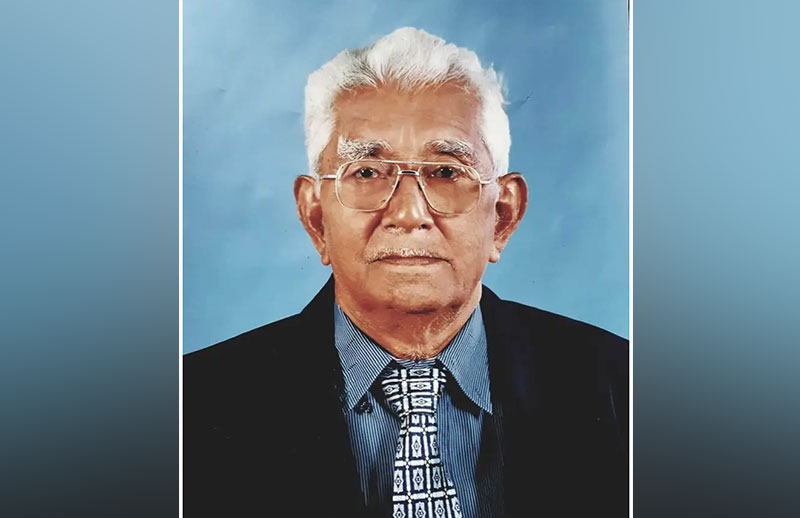
1935 – 2025
With heavy hearts, we share the passing of our dear neighbor, mentor, and cherished friend, Raja Uncle — known formally as Mr. Rajapaksha — who passed away peacefully on April 1, 2025, at the age of 89.
For over 50 he was a constant and beloved presence in our community — someone whose actions spoke louder than words, and whose kindness left a mark on every life he touched. Gentle in spirit, firm in values, and endlessly thoughtful, he helped shape the heart of Bogahawatta with his humility, quiet strength, and unwavering dedication.
He carried himself with grace and dignity — slim, well-groomed, and strikingly handsome, with a calm confidence that made people feel at ease. He never tried to be a person who gave orders — instead, he led through respect, active listening, and thoughtful action. His leadership was never loud — it was steady, consistent, and deeply human.
A founding member of the Bogahawatta Welfare Society, Raja Uncle gave more than 40 years of devoted service to the betterment of the Bogahawatta community. In the 1980s, as the area grew and safety became a concern, he established the neighborhood watch, restoring trust and unity in a time of change.
He organized road cleaning and repair efforts, worked alongside neighbors, and played a vital role in the construction of the Bogahawatta Welfare Society headquarters, which stands today as a symbol of unity and progress.
He also cared deeply for everyday needs. For nearly 20 years, before running water was available, the community well was a lifeline. When it fell into disrepair, Raja Uncle would quietly take the responsibility to clean and maintain it, asking for no recognition. I had the honor of helping him at times, and I saw the pride and purpose behind every quiet act.
When I served as president of the local youth society, he became my mentor. With his help, we organized a talent show, community art exhibition, built a mini library, and gave young people opportunities to lead. His daughter Tharanga, the society’s secretary, worked beside him — a reflection of the values he passed on.
He also shaped my personal journey. He introduced me to a temple, and gently guided me toward a spiritual life I still hold close today.
He was our protector. If a stranger walked down our lane, he would calmly and respectfully inquire about their purpose, ensuring the safety of every home and child. During a heated argument in my youth, he stood nearby for over an hour, silently watching until it ended, and then walked me home. He didn’t lecture. He didn’t judge. He simply cared.
Every April, without fail, he was the Master of Ceremonies at the Sinhala and Tamil New Year festival. His voice, his presence, and his joyful warmth brought the entire community together in celebration year after year.
In times of sorrow, he led with compassion. He would gather neighbors to visit grieving families, sometimes traveling great distances, and delivered eloquent eulogies that offered comfort and honored lives with dignity.
What truly set Raja Uncle apart was his love — especially the remarkable bond he shared with his wife. Their marriage was the most loving I have ever witnessed. They were the love of each other’s lives — gentle, respectful, and unwavering. He never raised his voice. They never let conflict come between them. Their partnership was built on trust, affection, and shared values.
In July 1980, as public servants, the two of them stood together in protest against unjust government layoffs. They both lost their jobs, but they stood by their beliefs. They started a business together, overcame hardship side by side, and were eventually reinstated. In time, Mrs. Rajapaksha rose to a top-level position in Sri Lanka’s Department of Immigration and Emigration — a testament to her brilliance and their shared resilience.
They raised their children in a home of dignity and purpose. In a country where less than five percent were admitted to university at the time, all three — Tharanga, Lahiru, and Lasitha — were accepted. A rare and proud achievement rooted in hard work and love.
His family grew across the world — Lasitha became a British citizen, and Lahiru a citizen of Australia. Raja Uncle visited them often, maintaining the same closeness and warmth across any distance.
And perhaps the most remarkable of all: he helped lead a place that was once a quiet, forested area in the 1970s into a thriving, respected neighborhood — one so valued that even a Defense Secretary of Sri Lanka chose to make it his home. This was not the work of ambition, but of vision and service — built slowly, over decades, through trust and integrity.
To me, as his next-door neighbor, he was one of the most steady and trusted influences in my life. He showed me that a meaningful life isn’t defined by what we achieve — but by how we treat others, what we give, and how we listen. I shaped my life after him.
Although I haven’t been as closely associated with him since leaving Sri Lanka in 2000 and becoming a citizen of the United States, his memory has remained with me every step of the way. These are just a few of the memories I carry — as much as I can recall. I still wish, from the bottom of my heart, that he could be my neighbor forever — to guide me, to listen, to share his quiet vision.
He touched so many lives, across generations. There are countless stories, small and great, that live on in the hearts of those who knew him. His presence will be remembered not only through words, but in the community he shaped, the values he carried, and the lives he quietly uplifted over these 50+ years.
May his soul rest in peace, and may we carry forward the spirit he lived by — humility, strength, compassion, and quiet dedication — just as Raja Uncle did, every single day of his extraordinary life.
-
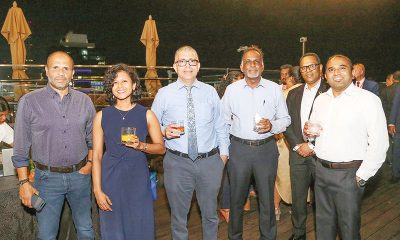
 Business7 days ago
Business7 days agoMembers’ Night of the Sri Lanka – Russia Business Council of The Ceylon Chamber of Commerce
-

 Features7 days ago
Features7 days agoLiberation Day tariffs chaos could cause permanent damage to US economy, amid global tensions
-
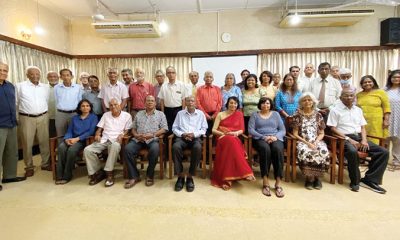
 Features7 days ago
Features7 days agoMinds and Memories picturing 65 years of Sri Lankan Politics and Society
-
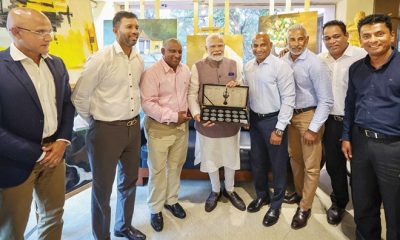
 Sports7 days ago
Sports7 days agoLankan legends, Modi and the Jaffna dream
-

 Business20 hours ago
Business20 hours agoDIMO pioneers major fleet expansion with Tata SIGNA Prime Movers for ILM
-
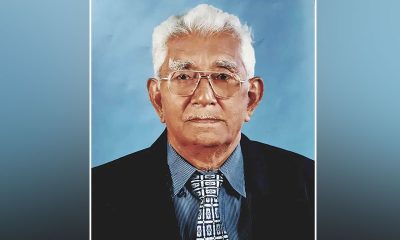
 Opinion7 days ago
Opinion7 days agoEnd of an Era: Passing away of Raja Uncle (Mr. Rajapaksha)
-

 Features7 days ago
Features7 days agoRepentance Leads to Passion
-
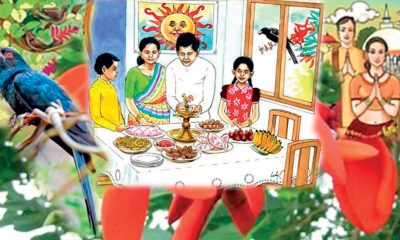
 Features7 days ago
Features7 days agoRecollections of two past Aprils











